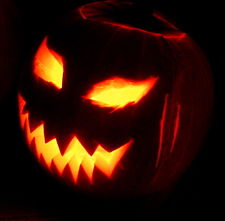Happy Halloween!
Halloween
Halloween or Hallowe'en (a contraction of its original title "All Hallows' Evening"), also known as All Hallows' Eve, is a yearly holiday observed around the world on October 31, the eve before the Western Christian feast of All Hallows.
According to some scholars, All Hallows' Eve initially incorporated traditions from pagan harvest festivals and festivals honoring the dead, particularly the Celtic Samhain; other scholars maintain that the feast originated entirely independently of Samhain.
Typical festive Halloween activities include trick-or-treating (also known as "guising"), attending costume parties, carving jack-o'-lanterns, lighting bonfires, apple bobbing, visiting haunted attractions, playing pranks, telling scary stories, and watching horror films.

Etymology
The word Halloween was first used in the 16th century and represents a Scottish variant of the fuller All-Hallows'-Even ("evening"), that is, the night before All Hallows' Day. Although the phrase All Hallows' is found in Old English (mass-day of all saints), All-Hallows-Even is itself not seen until 1556.
Pre-Christian influences
The Halloween holiday is commonly thought to have pagan roots, even though the etymology of the word is Christian. Historian Nicholas Rogers, exploring the origins of Halloween, notes that while "some folklorists have detected its origins in the Roman feast of Pomona, the goddess of fruits and seeds, or in the festival of the dead called Parentalia, it is more typically linked to the Celtic festival of Samhain, derived from the Old Irish Samuin meaning "summer's end". Samhain was the first and the most important of the four quarter days in the medieval Irish and Scottish calendar and, falling on the last day of autumn, it was a time for stock-taking and preparation for the cold winter months ahead. There was also a sense that this was the time of year when the physical and supernatural worlds were closest and magical things could happen.
The souls of the dead were supposed to revisit their homes on Samhain eve. To ward off these spirits, the Gaels built huge, symbolically regenerative bonfires and invoked the help of the gods through animal and perhaps even human sacrifice. In the Western Isles of Scotland the Sluagh, or fairy host was regarded as composed of the souls of the dead flying through the air, and the feast of the dead at Hallowe'en was likewise the festival of the fairies.